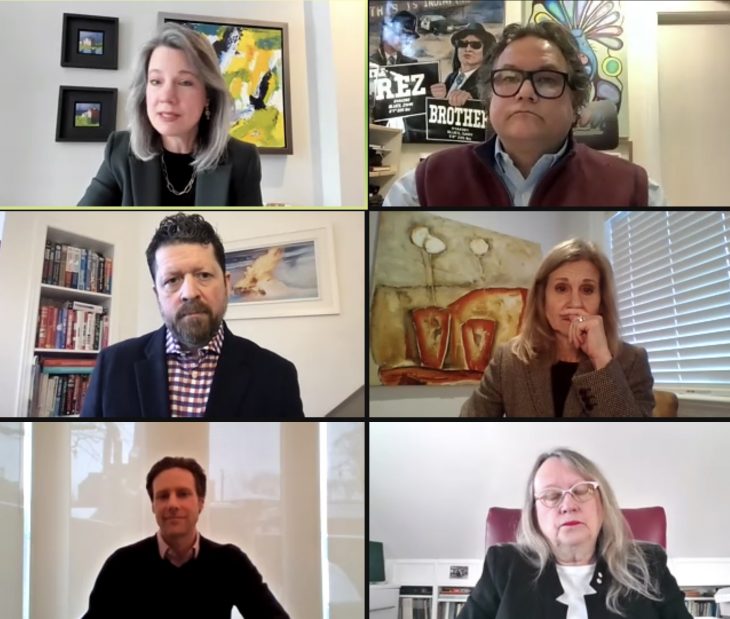
THE FUTURE IS BRIGHT for Canadian broadcasting – if the recently announced Bill C-11, also referred to as the Online Streaming Act, manages to be passed, that is.
This was the general consensus of a panel of industry veterans who came together today to talk about the Broadcasting Act and the future of Canadian broadcasting at the Canadian Media Producers Association’s (CMPA) Prime Time event.
The panel, titled The Future is Now, was presented in partnership with Telefilm Canada and was moderated by Reynolds Mastin (above, bottom left), president and CEO of the CMPA.
The panel featured Christa Dickenson (top left), executive director and CEO of Telefilm Canada, Jesse Wente (top right), co-executive director of the Indigenous Screen Office, Kevin Desjardins (middle left), president of the Canadian Association of Broadcasters (CAB), Barbara Williams (middle right), executive vice-president of the CBC and Valerie Creighton (bottom right), president and CEO of the Canada Media Fund (CMF).
“We see that there’s real hope, potentially, in this kind of a bill going forward to support an industry that we all really care very deeply about,” Williams said of C-11.
She did begin her comments with a caveat though – she was being careful with what she said because she did not have a chance to read the bill in very much detail yet as it was introduced less than 24 hours before the panel began.
Nevertheless, the whole panel agreed there are elements of the proposed legislation that are crucial for the industry moving forward.
“I think we’re all relieved that that has occurred,” Wente said of the bill’s introduction. He noted it seems if the bill is passed it would trigger a new level of support for Indigenous broadcasting undertakings and for Indigenous content creation in Canada.
“Indigenous folks have been advocating for the changes that we see in this bill… since about the time the last time this bill was updated. The Indigenous Screen Offices actually exist in part because of that advocacy and exists in part to make sure these changes were brought about in the next iteration of the Broadcasting Act,” Wente said.
Desjardins emphasized how important it is for Canada’s broadcasting legislation to catch up to where the broadcasting system is.
“I think that we’re certainly encouraged to see the legislation come forward,” Desjardins agreed. “I’ve said before… the Broadcasting Act right now is stuck in a VHS era at a point where the broadcasting system has evolved by leaps and bounds beyond that.”
“I think the identification of these other players, which are having a massive impact on our sector… to have them just acknowledged as players and to not be able to really circumvent the system is really the important piece to this,” he said.
However, there is also another side to this, Desjardins argued. “We need to make sure that as we’re enshrining these things into legislation, that we’re not doing something that enshrines inequity between the relative players in the system,” he said. There is a need “to make sure that at the end of this that it still makes sense for those online streamers to participate in the Canadian system and to contribute back to it.”
Creighton agreed, arguing the bill is key to providing the right tools for the present time, but she hopes “we don’t end up tying down new ropes because that’s a tendency.” Flexibility is essential, she said.
Another benefit of updating the Broadcasting Act brought up during the panel relates to data. “One of the greatest opportunities lies on the little less discussed element of the initial bill, which is making the system more inclusive for diverse communities in Canada and increasing access to industry data,” Dickenson said. “There is no way we can change it without that data.”
Beyond agreeing it is good the bill has now been introduced, the panel also agreed it would be best if it was passed quickly.
Creighton said she is hoping for a “quick and non-controversial passage” of the bill.
Desjardins pointed out if the bill “stalls or it gets bogged down, ultimately it just plays into the hands of foreign players who are just going to get a further head start on us.”
“I think that private broadcasters are doing amazing things in terms of innovating, in terms of using multi platforms… and yet at the same time we still are encumbered with a regulatory system which is absolutely looking in the rear-view mirror and not looking ahead,” he said.
“And so, the longer that this takes the greater a head start that the players outside of Canada will have in order to dictate how or if Canadian culture gets shown to Canadians and Canadian stories get shown to Canadians.”
Wente also highlighted the importance of getting the bill passed quickly. “Every day we don’t do this, for sure Indigenous creators are lagged, but we’ve been lagging in the system up to this point anyway, I think the message should be… the whole sector lags just in terms of global engagement the longer we take to pass this on.”
Mastin agreed with him, noting he further believes there is unanimous agreement on that point.
Mastin later asked the panelists what would happen if the bill did not pass.
Responses generally indicated everyone would keep moving forward and indeed, many were quick to point out that is what their organizations have been doing already.
“Sure, it’s a little concerning, to say the least, if the bill doesn’t pass,” Williams said. “That the status quo if you will, is maybe not sustainable. Yeah, I think we all have those middle of the night worries for sure, but in the interim I’m just not a doom and gloom person. There’s just stuff to do.”



